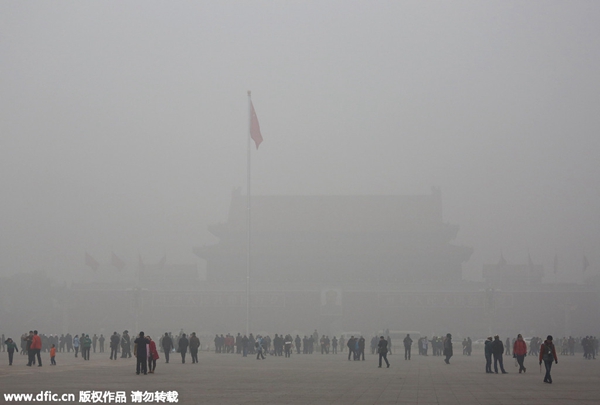Reduce air pollution to protect people's health
Updated: 2016-01-06 07:22
(China Daily)
|
|||||||||||
 |
|
Visitors walk at the Tian'anmen Square amid severe smog in Beijing on Dec 15. [Photo/IC] |
Seemingly better air quality statistics are cold comfort for Chinese people who have a huge stake in terms of their health in the country's ongoing campaign against air pollution, which could last for years. So instead of breathing a sigh of relief, policymakers should focus on taking more concrete measures to reduce hazardous smog.
It is counterintuitive to believe that Beijing's air quality improved in 2015 when thick smog in December alone forced the Chinese capital to twice issue the highest level alert for pollution.
That is not to say Beijing's environmental authorities might have statistically got it wrong that the average concentration of PM2.5 (harmful airborne particulate matter with a diameter of 2.5microns or less) was 81 micrograms per cubic meter in 2015, marking a drop of 6 percent from 2014 and 10 percent from 2013.
Such reduction in PM2.5 concentration should prove the effectiveness of the Beijing municipal government's efforts to replace coal fired boilers with natural gas powered facilities, force more polluting vehicles off the road, and close or shift heavy polluting factories.
But there seems a discrepancy between the public's impression of the air quality and the rosy picture the data portray. People's increasing awareness of the ill effects of air pollution and their difficulty in discerning the marginal decrease in PM2.5 may explain the nonchalance Beijing residents generally displayed after the local environmental protection bureau announced on Monday that the "number of days of most serious PM2.5 pollution is falling each year".
Sitting in one of China's most heavily polluted regions, it is difficult for Beijing to regain clean air against the main sources of pollution—vehicles, coal burning, industrial pollution and dust from construction sites.
So even if Beijing has succeeded in reducing the annual average pollution level, it is far too early for policymakers to become complacent. Instead, the reality that the capital was shrouded in toxic air for 22 days in the last two months of 2015, which are 15 days more than the same period in 2014 with average PM2.5 concentration reaching about seven times the national standard, speaks of only greater urgency to take proper action to protect people from such hazardous smog.
We hope the country can overcome serious air pollution as soon as possible. But the environmental authorities should not become cheerleaders. Instead, their better preparation for the worst case scenario will assure us more than some rosy air quality data.
Related Stories
Beijing pollution report notes annual improvements 2016-01-04 12:03
Regions to tackle pollution 2016-01-04 07:55
Courts call for more vigilance against pollution 2015-12-30 08:36
Beijing issues blue alert for heavy air pollution 2015-12-29 20:06
Joint efforts to curb air pollution 2015-12-25 08:55
40 cities issue alerts for pollution in N China 2015-12-22 16:15
Today's Top News
Concerns grow over Saudi-Iranian rising tensions
Obama tightens gun rules, requires background check
Refugee boy becomes first casualty in 2016
China's high-tech exports beat Japan and South Korea
Storm Frank batters northern Britain
Over 1 million refugees fled to Europe by sea in 2015
Germany to spend 17b euros on refugees in 2016
Demand booms for high-end financial talent
Hot Topics
Lunar probe , China growth forecasts, Emission rules get tougher, China seen through 'colored lens', International board,
Editor's Picks

|

|

|

|

|

|






